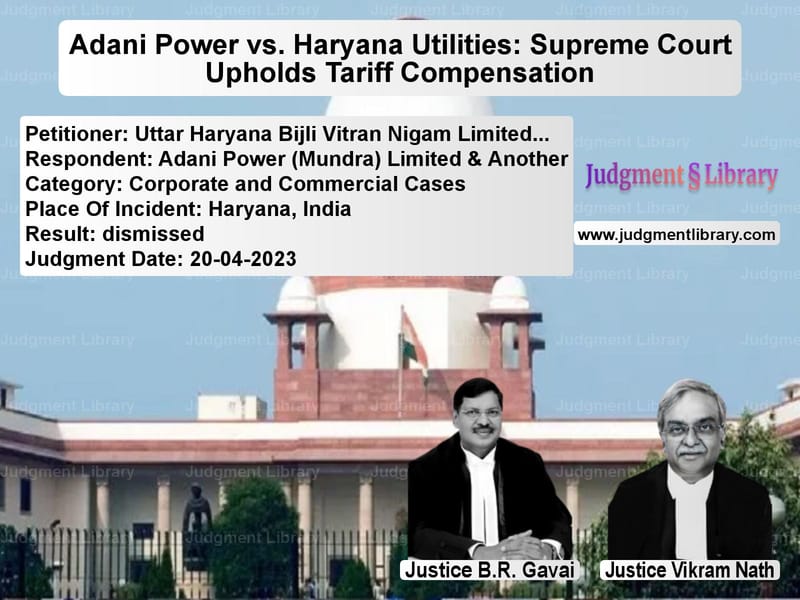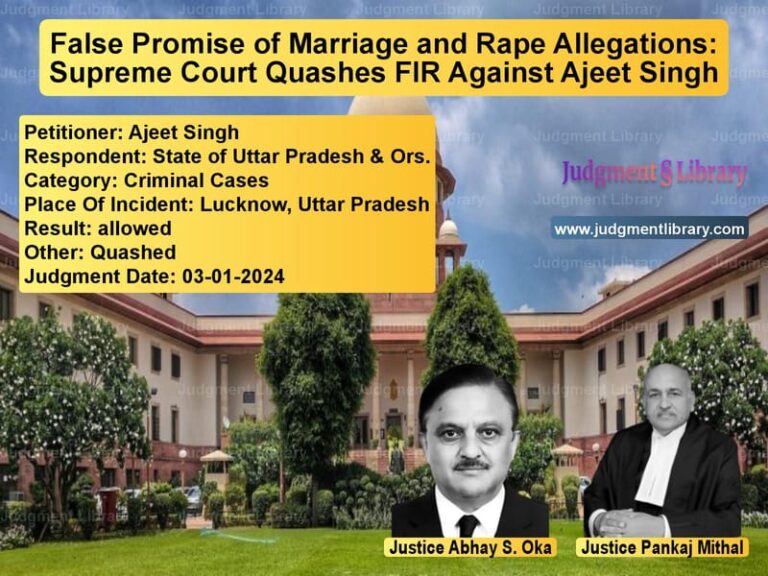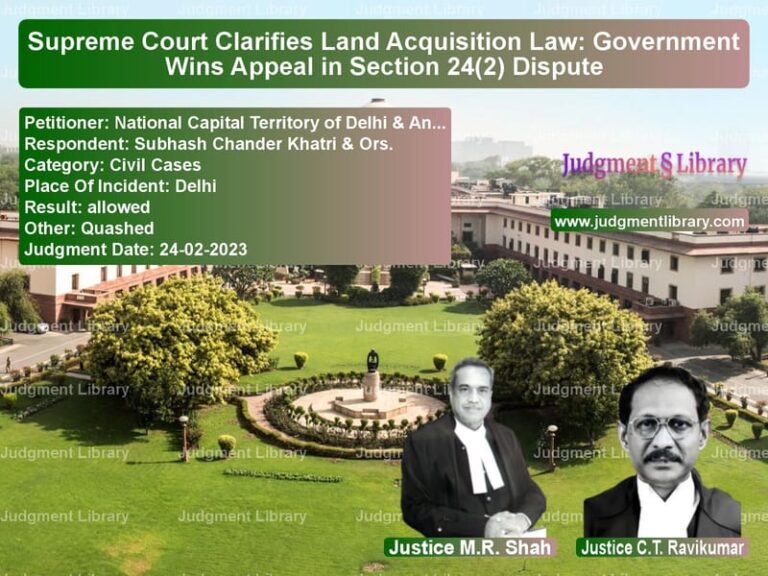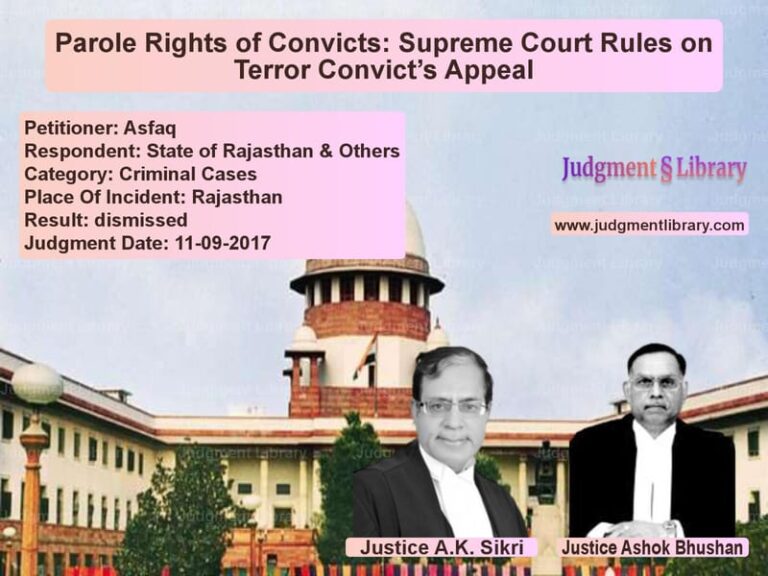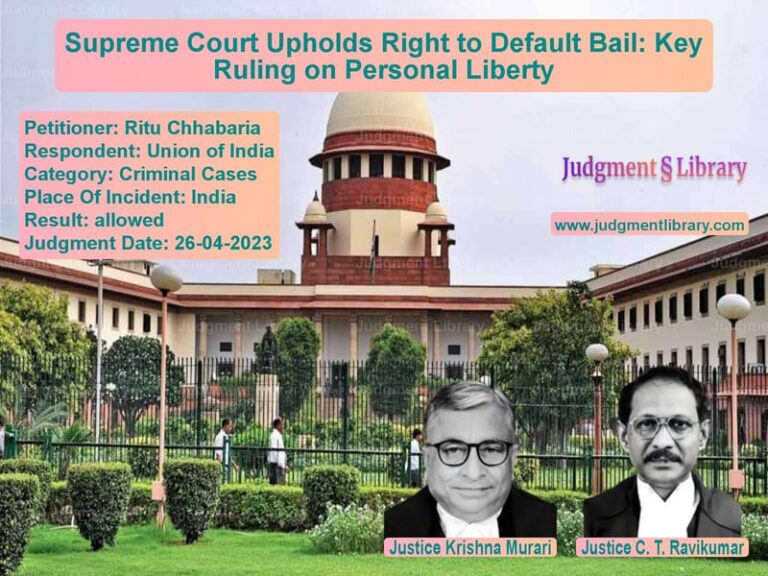Adani Power vs. Haryana Utilities: Supreme Court Upholds Tariff Compensation
The Supreme Court of India recently upheld the judgment of the Appellate Tribunal for Electricity (APTEL), which confirmed the Central Electricity Regulatory Commission (CERC)’s decision granting compensation to Adani Power (Mundra) Limited (AP(M)L) for increased coal costs under the SHAKTI policy. The ruling clarifies the applicability of ‘Change in Law’ provisions in Power Purchase Agreements (PPAs) and reinforces the importance of expert regulatory bodies in the energy sector.
Background of the Case
The dispute originated from two Power Purchase Agreements (PPAs) signed on August 7, 2008, between Haryana Utilities (Uttar Haryana Bijli Vitran Nigam Limited and Dakshin Haryana Bijli Vitran Nigam Limited) and AP(M)L for a contracted power supply of 1,424 MW from Adani’s generating units in Gujarat. The agreements were based on a competitive bidding process conducted under Section 63 of the Electricity Act, 2003.
Adani Power later sought compensation for increased fuel costs due to changes in Indian coal allocation policies. The company approached CERC and was granted relief under the ‘Change in Law’ provision of the PPA. Haryana Utilities challenged this decision before APTEL, which upheld CERC’s ruling. Dissatisfied, Haryana Utilities escalated the matter to the Supreme Court.
Petitioner’s Arguments (Haryana Utilities)
- The SHAKTI policy, introduced in 2017 to streamline coal allocation, could not be considered a ‘Change in Law’ event under the PPA.
- Adani Power had failed to issue a proper notice of the ‘Change in Law’ event as required under the PPA.
- The tribunal’s decision to award ‘Carrying Cost’ (compensation for delayed payments) was not legally justified.
- The decision was against the principle of competitive bidding and would result in higher tariffs for consumers.
Respondent’s Arguments (Adani Power)
- The SHAKTI policy reduced coal supply to 75% of the assured quantity, increasing fuel costs, which qualified as a ‘Change in Law’ under the PPA.
- CERC had correctly interpreted the contractual provisions and past Supreme Court rulings in determining Adani’s entitlement to compensation.
- All procedural requirements, including notices and claims, had been fulfilled.
- The regulatory commissions, being expert bodies, had thoroughly examined the issue, and their findings should not be disturbed.
Supreme Court’s Observations
- The SHAKTI policy constituted a ‘Change in Law’ event under the PPA, as it altered coal supply conditions, impacting the power generator’s costs.
- The expert regulatory bodies—CERC and APTEL—had conducted a detailed assessment of the issue, and their findings did not warrant judicial interference.
- The Court relied on its previous ruling in Energy Watchdog v. CERC (2017), where it held that changes in Indian coal laws affecting supply should be compensated under ‘Change in Law’ clauses.
- Haryana Utilities had failed to provide compelling evidence to overturn the expert authorities’ conclusions.
Key Judicial Findings
- The Court reaffirmed that policy changes affecting fuel supply fall within the scope of ‘Change in Law’ provisions.
- The decision reinforced that specialized regulatory bodies like CERC and APTEL must be given due deference in complex technical matters.
- Carrying Cost was justified, as delayed compensation would otherwise impose financial burdens on power producers.
Final Judgment
The Supreme Court ruled in favor of Adani Power:
- The APTEL and CERC decisions were upheld.
- The Haryana Utilities’ appeal was dismissed.
- Adani Power’s entitlement to compensation under the ‘Change in Law’ provision was confirmed.
Implications of the Judgment
The ruling has far-reaching implications for India’s power sector:
- Clarification on ‘Change in Law’: The judgment provides clarity on when policy changes qualify for compensation under PPAs.
- Judicial Deference to Expert Bodies: The Court reiterated that regulatory commissions’ decisions should not be lightly interfered with.
- Financial Stability for Power Generators: The ruling ensures that power companies are not unfairly burdened by unforeseen policy shifts.
- Impact on Consumers: While the judgment protects generators, it also means potential increases in electricity tariffs due to cost pass-through mechanisms.
Conclusion
The Supreme Court’s ruling in Uttar Haryana Bijli Vitran Nigam Ltd. v. Adani Power (Mundra) Ltd. reinforces the principle that power generators must be compensated for regulatory changes affecting fuel supply. By upholding the decisions of CERC and APTEL, the Court has affirmed the autonomy of expert regulatory bodies in the electricity sector while ensuring financial viability for power producers facing policy-driven cost increases.
Petitioner Name: Uttar Haryana Bijli Vitran Nigam Limited & Another.Respondent Name: Adani Power (Mundra) Limited & Another.Judgment By: Justice B.R. Gavai, Justice Vikram Nath.Place Of Incident: Haryana, India.Judgment Date: 20-04-2023.
Don’t miss out on the full details! Download the complete judgment in PDF format below and gain valuable insights instantly!
Download Judgment: uttar-haryana-bijli-vs-adani-power-(mundra)-supreme-court-of-india-judgment-dated-20-04-2023.pdf
Directly Download Judgment: Directly download this Judgment
See all petitions in Company Law
See all petitions in Corporate Compliance
See all petitions in unfair trade practices
See all petitions in Judgment by B R Gavai
See all petitions in Judgment by Vikram Nath
See all petitions in dismissed
See all petitions in supreme court of India judgments April 2023
See all petitions in 2023 judgments
See all posts in Corporate and Commercial Cases Category
See all allowed petitions in Corporate and Commercial Cases Category
See all Dismissed petitions in Corporate and Commercial Cases Category
See all partially allowed petitions in Corporate and Commercial Cases Category

